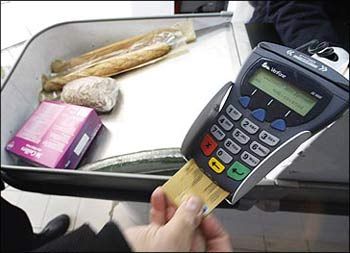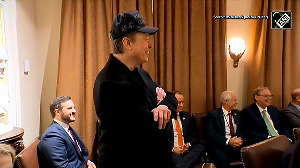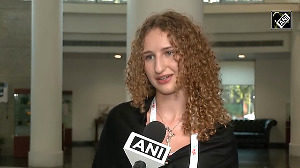 A senior finance ministry source said making the use of debit cards and e-wallets compulsory across the board is legally untenable, but banks have been asked to insist their account holders use these instruments.
A senior finance ministry source said making the use of debit cards and e-wallets compulsory across the board is legally untenable, but banks have been asked to insist their account holders use these instruments.
Sanjeeb Mukherjee and Archis Mohan report.
A number of ministries and departments in the central government, especially those that have a direct interface with the public, have gotten down to chalking out their strategies to go cashless after Prime Minister Narendra Modi directed them to switch from currency-based transactions to online and cheque payments.
The cashless initiative will embrace a wide range of dealings, including those related to downstream payments such as payment to labourers.
The directives were issued by Prime Minister Modi on Friday night in a special Cabinet meeting held to review the demonetisation drive.
The steps to go cashless would be reviewed in a follow-up cabinet meeting likely to be held next week.
On its part, the labour ministry, along with the finance ministry, has decided to hold special camps in specific locations in all the over 640 districts in the country to facilitate opening of bank accounts for labourers in the organised and unorganised sectors.
Communications have been sent to all state governments for cooperation to hold such camps, while a team consisting of district magistrates, lead district manager of the bank and labour officer would decide on modalities of holding such camps .
A senior finance ministry source said making the use of debit cards and e-wallets compulsory across the board is legally untenable, but banks have been asked to insist their account holders use these instruments.
On Thursday, the finance minister held a video-conference with senior bank officials.
Officials bemoaned that politicians, the judiciary and the media were unaware of the extent to which plastic money has penetrated, and claimed that its use is growing not just in urban areas, but also in semi-urban and rural areas for ATM withdrawals.
Quoting Reserve Bank of India data, a source claimed there are nearly 720 million ATM cards in the country.
Of these, as many as 450 million debit cards, he claimed, are used routinely, or intermittently, for cash withdrawals from ATMs.
In food and agriculture ministries, meetings were held to chalk out a strategy to go cashless. Food Minister Ramvilas Paswan directed his officials to achieve 100 per cent cashless working within the next 15 days.
All payments made for purchasing foodgrains by the Food Corporation of India and others would have to be mandatorily done through Real Time Gross Settlement or cheques, while advisories have been issued to states to install card readers alongside point-of-sale devices.
At present, these devices have been installed at about a fifth of the 500,000-plus ration shops across the country.
For FCI labour payments too, the Centre has directed that all payments made henceforth should in bank accounts.
'The prime minister is very serious on the issue of going cashless. Our officials have been told to go comply as far as possible,' Paswan was quoted as saying by PTI after the meeting.
Agriculture Minister Radha Mohan Singh also held a meeting with officials from fertiliser companies to see if fertiliser sales could be done entirely on the online payment systems.
The government also constituted a high-powered committee under NITI Aayog Chief Executive Officer Amitabh Kant to look into digital payments for all government-citizen transactions.
The Aayog, in a presentation made to government some time ago, had in fact pitched for promoting e-payments in a big way.
The route it suggested included direct integration of e-wallets such as Paytm with the Unified Payment Interface, increasing wallet transaction limits from Rs 10,000 on presentation of additional KYCs, encouraging digital payments for all government services and surcharge on cash handling beyond a certain limit to discourage cash.
The new committee under Kant will identify and operationalise in the earliest possible timeframe user-friendly digital payment options in all sectors of the economy, an official statement said.












 © 2025
© 2025